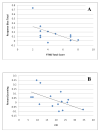The relationship between reward-based learning and nicotine dependence in smokers with schizophrenia
- PMID: 22342123
- PMCID: PMC3351530
- DOI: 10.1016/j.psychres.2011.09.011
The relationship between reward-based learning and nicotine dependence in smokers with schizophrenia
Abstract
Cigarette smoking rates remain remarkably high in schizophrenia relative to smoking in other psychiatric groups. Impairments in the reward system may be related to elevated rates of nicotine dependence and lower cessation rates in this psychiatric group. Smokers with schizophrenia and schizoaffective disorder (SWS; n=15; M(age)=54.87, S.D.=6.51, 100% male) and a non-psychiatric control group of smokers (NCL; n=16; M(age)=50.38, S.D.=11.52; 93.8% male) were administered a computerized signal detection task to measure reward-based learning. Performance on the signal detection task was assessed by response bias, discriminability, reaction time, and hit rate. Clinician-assessed and self-reported measures of smoking and psychiatric symptoms were completed. SWS exhibited similar patterns of reward-based learning compared to control smokers. However, decreased reward-based learning was associated with increased levels of nicotine dependence in SWS, but not among control smokers. Nicotine withdrawal and urge to smoke were correlated with anhedonia within the SWS group. Among SWS, reduced reward responsiveness and increased anhedonia were associated with and may contribute to greater co-occurring nicotine dependence. These findings emphasize the importance of targeting reward system functioning in smoking cessation treatment for individuals with schizophrenia.
Published by Elsevier Ireland Ltd.
Figures

References
-
- Beck AT, Steer RA, Ball R, Ranieri WF. Comparison of Beck Depression Inventories- IA and –II in psychiatric outpatients. Journal of Personality Assessment. 1996;67:588–597. - PubMed
-
- Berridge KC, Robinson TE. Parsing reward. Trends in Neuroscience. 2003;26:507–513. - PubMed
-
- Chapman LJ, Chapman JP, Raulin ML. Scales for physical and social anhedonia. Journal of Abnormal Psychology. 1976;85:374–382. - PubMed
Publication types
MeSH terms
Grants and funding
LinkOut - more resources
Full Text Sources
Medical
Miscellaneous

